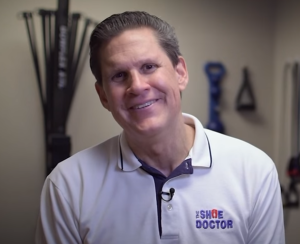Discovering the right time to invest in orthotics for Achilles tendonitis is crucial for effective treatment. Recognizing the signs indicating the need for custom prescription orthotics or replacement insoles intervention can significantly improve your condition and overall quality of life. From persistent pain and discomfort to limited mobility and ongoing inflammation, these indicators play a vital role in guiding you toward seeking professional help. Understanding these 10 key signs can empower you to take proactive steps toward managing and alleviating Achilles tendonitis symptoms. Stay tuned to learn more about when it might be time to consider investing in orthotics for optimal foot health.
Recognizing Achilles Tendonitis
Symptoms Overview
Achilles tendonitis manifests through pain and swelling at the back of the heel, especially after physical activity. The affected area may feel stiff in the morning.
Differentiating Achilles tendonitis from other foot conditions involves noting tenderness along the tendon when touched. This condition often presents with thickening of the tendon as well.
If left untreated, Achilles tendonitis symptoms can worsen over time. This progression may lead to increased pain, difficulty walking, and even weakening of the tendon.
Causes And Risk Factors
Achilles tendonitis primarily stems from overuse or repetitive stress on the Achilles tendon during physical activities like running or jumping. Such actions can cause microscopic tears in the tendon.
Risk factors for developing Achilles tendonitis include inadequate stretching before exercise, improper footwear, and sudden increases in physical activity intensity. These factors contribute to excessive strain on the Achilles tendon.
Lifestyle choices play a crucial role in the development of Achilles tendonitis. Engaging in high-impact sports without proper conditioning or using worn-out footwear can significantly increase the risk of developing this condition.
Signs You Need Orthotics
Persistent Foot Pain
Persistent foot pain is a common symptom of Achilles tendonitis, indicating inflammation and strain on the Achilles tendon. Ignoring persistent foot pain can lead to worsening symptoms and prolonged recovery times. Seeking treatment promptly is crucial to prevent further complications.
Heel Discomfort
Heel discomfort in Achilles tendonitis manifests as a sharp pain at the back of the heel, especially during physical activities. This discomfort can hinder daily tasks and impact mobility. Orthotics provide cushioning and support to alleviate heel discomfort effectively.
Problems With Flat Feet
Individuals with flat feet often experience issues like overpronation, leading to increased stress on the Achilles tendon. Custom orthotics are tailored to address flat foot problems by providing arch support and correcting gait abnormalities, reducing the risk of Achilles tendonitis.
Issues With High Arches
High arches can result in improper weight distribution and excessive pressure on the Achilles tendon, causing overuse injuries. Custom orthotics designed for high arches help distribute pressure evenly, reducing strain on the Achilles tendon and preventing injuries.
Bunions Impact
Bunions can exacerbate foot pain in individuals with Achilles tendonitis due to misalignment of the big toe joint. Orthotics are crucial in managing bunions by providing support and alignment to reduce pressure on the affected area, alleviating pain and discomfort.
Shin Splints Pain
Shin splints are often linked to underlying foot issues like overpronation or high arches, which can contribute to Achilles tendonitis. Orthotics offer stability and shock absorption, reducing strain on the shin muscles and alleviating pain associated with shin splints.
Overpronation Or Supination
Abnormal foot pronation such as overpronation or supination can disrupt natural foot mechanics, increasing the risk of Achilles tendonitis. Custom orthotics correct these pronation issues by providing proper alignment and support, promoting healthy foot function.
Constant Foot Fatigue
Chronic foot fatigue may indicate underlying foot problems such as muscle imbalances or poor arch support. Orthotics help redistribute pressure evenly across the feet, reducing fatigue and discomfort while improving overall comfort during daily activities.
Recurrent Sports Injuries
Recurrent sports injuries involving the Achilles tendon signal the need for orthotic intervention to prevent further damage. Custom orthotics offer enhanced shock absorption, stability, and support, reducing the risk of recurring sports-related injuries.
Diabetic Foot Concerns
Diabetes poses specific risks for foot health due to reduced blood flow and nerve damage. Custom orthotics designed for diabetic individuals provide cushioning, protection against ulcers, and support for proper foot alignment, minimizing complications associated with diabetes.
Understanding Orthotics
Types Of Orthotics
Orthotics for Achilles tendonitis come in various forms, including inserts, braces, and splints. These devices help support the foot and ankle to alleviate pain. Custom orthotics are specially made to fit an individual’s foot shape and address specific issues. On the other hand, over-the-counter orthotics are mass-produced and may offer general support.
When considering orthotics for Achilles tendonitis, it’s crucial to understand the differences between custom and over-the-counter options. Custom orthotics are molded to the unique contours of your feet, providing personalized support tailored to your specific needs. Over-the-counter orthotics, while more affordable, may not offer the same level of customization or targeted relief.
Exploring the world of orthotics reveals how these devices can be tailored to meet the distinct requirements of each individual’s feet. By addressing issues such as overpronation or high arches, orthotics can effectively reduce strain on the Achilles tendon and promote proper foot alignment. Whether opting for custom or over-the-counter orthotics, finding the right fit is essential for maximum benefit.
Benefits Of Achilles Tendonitis
Using orthotics for Achilles tendonitis offers a range of benefits, including pain relief and enhanced foot function. By providing additional support and cushioning, orthotics help reduce stress on the Achilles tendon during movement. This can lead to decreased discomfort and improved mobility for individuals dealing with this condition.
Orthotics play a vital role in not only alleviating existing pain but also in preventing further damage to the Achilles tendon. By correcting biomechanical imbalances and improving gait mechanics, these devices aid in reducing strain on the affected area. This proactive approach can help individuals manage their condition effectively and avoid worsening symptoms over time.
Recognizing the significance of using orthotics for Achilles tendonitis highlights their value in promoting overall foot health. With proper support and alignment provided by these devices, individuals can experience improved comfort while engaging in daily activities. The benefits extend beyond immediate pain relief to long-term management of Achilles tendon issues.
Custom Vs. Over-The-Counter
Distinguishing between custom orthotics and over-the-counter options is crucial when seeking solutions for Achilles tendonitis. Custom orthotics offer personalized support by addressing specific foot concerns unique to each individual. This tailored approach ensures optimal comfort and effectiveness in managing Achilles tendon issues.
Understanding the advantages of custom orthotics underscores their ability to provide targeted relief for Achilles tendonitis symptoms. While over-the-counter options may be more accessible, they often lack the precision required to address individual biomechanical abnormalities effectively. Custom orthotics stand out for their ability to cater to a person’s exact needs with specialized design features.
Learning about custom vs. over-the-counter orthotic options empowers individuals dealing with Achilles tendonitis to make informed decisions about their treatment plan. By choosing custom orthotics, individuals can benefit from personalized care that addresses their specific foot concerns comprehensively.
Orthotics And Foot Alignment
Correcting Overpronation
Orthotics are custom-made shoe inserts designed to correct alignment issues like overpronation, where the foot rolls inward excessively. By providing support and stability, orthotics can effectively address overpronation, reducing strain on the Achilles tendon. Overpronation can lead to poor foot alignment, causing various foot and ankle problems if left untreated. It’s crucial to tackle overpronation early on to prevent injuries and maintain proper foot function.
- Orthotics correct overpronation
- Overpronation impacts foot alignment
- Addressing overpronation prevents foot injuries
Managing Supination
Supination is another common issue that orthotics can help manage alignment. This condition occurs when the foot rolls outward excessively, affecting foot stability and weight distribution. Orthotics play a vital role in correcting supination by providing cushioning and support to realign the foot properly. By managing supination effectively, orthotics contribute to better overall foot alignment and reduce the risk of injuries.
- Orthotics manage supination
- Supination affects foot stability
- Correcting supination improves foot alignment
Orthotics And Pain Relief
Easing Heel Pain
Orthotics play a crucial role in easing heel pain caused by Achilles tendonitis. These shoe inserts provide support to the heel, reducing strain on the affected tissue. By addressing heel pain early with orthotics, individuals can alleviate discomfort and promote healing.
Orthotics are designed to offer additional support for the arch of the foot, which helps in reducing shin splint pain. The inserts help stabilize the foot, preventing excessive movement that can exacerbate shin splints. Incorporating orthotics into footwear can significantly improve comfort during physical activities.
Reducing Shin Splints
Orthotics are beneficial in reducing shin splints, a common issue associated with Achilles tendonitis. They provide support to the foot’s arch, which helps distribute pressure evenly and reduce strain on the shins. By using orthotics, individuals can minimize discomfort and prevent further damage to the tissues.
The role of orthotics in providing additional support for the arch of the foot cannot be understated. This added stability helps prevent excessive pronation or supination, which can lead to shin splints. With proper support from orthotics, individuals can engage in physical activities with a reduced risk of developing shin splints.
Preventing Further Injuries
Orthotics play a crucial role in preventing sports injuries by providing support and stability. These customized inserts are designed to absorb shock from high-impact activities, reducing the strain on the Achilles tendon.
Understanding how orthotics absorb shock is essential in comprehending their effectiveness in preventing further injuries. By cushioning the foot and dispersing impact forces, orthotics help minimize the risk of overuse injuries like Achilles tendonitis.
Orthotics also correct gait issues, ensuring proper alignment of the feet and ankles during movement. This correction not only prevents injuries but also improves overall biomechanics, enhancing performance and reducing the likelihood of future problems.
Exploring the benefits of wearing orthotics daily reveals their continuous support and comfort for individuals with Achilles tendonitis. By providing consistent cushioning and stability, orthotics alleviate pressure on the affected tendon, promoting healing and reducing discomfort.
Understanding how orthotics offer continuous support throughout the day highlights their role in maintaining proper foot mechanics. Whether standing, walking, or engaging in physical activities, orthotics ensure that the feet are properly supported, reducing strain on the Achilles tendon.
Recognizing the long-term advantages of incorporating orthotics into daily wear emphasizes their impact on preventing recurrent injuries. By addressing underlying issues such as improper foot alignment or overpronation, orthotics help individuals with Achilles tendonitis maintain optimal foot health and function.

Choosing The Right Orthotics
Assessing Your Needs
When considering custom prescription orthotics for Achilles tendonitis, it’s crucial to assess your foot needs accurately. Begin by examining your gait and foot structure to determine the level of support required. Seek professional advice from a podiatrist or orthopedic specialist to ensure you choose the most suitable orthotic for your condition.
Understanding the importance of seeking professional guidance is essential in obtaining effective orthotic support. Specialists can conduct thorough evaluations to identify specific issues contributing to your Achilles tendonitis. By addressing these underlying problems, custom orthotics can alleviate pain and prevent further injuries.
Recognizing the signs that indicate the need for orthotics is key in managing Achilles tendonitis effectively. If you experience persistent heel pain, arch discomfort, or ankle instability, it may be time to consider using replacement insoles or custom orthotics. These symptoms signal an imbalance that orthotics can help correct, promoting proper foot alignment and reducing strain on the Achilles tendon.
Consulting A Specialist
Consulting a specialist for orthotic recommendations is highly beneficial when dealing with Achilles tendonitis. Podiatrists and orthopedic specialists possess the expertise needed to evaluate your foot condition accurately. Through detailed assessments, they can recommend the most appropriate type of orthotic to address your specific needs.
Specialists play a vital role in assessing foot conditions and providing tailored solutions through custom prescription orthotics. Their in-depth knowledge allows them to identify biomechanical issues contributing to Achilles tendonitis and offer personalized treatment plans. By consulting these experts, you can access specialized care that targets the root cause of your discomfort.
Recognize the expertise that specialists bring to addressing foot problems such as Achilles tendonitis. Their comprehensive understanding of lower limb anatomy and biomechanics enables them to create customized solutions that cater to individual requirements. By entrusting your foot health to these professionals, you can benefit from expert guidance and effective management strategies.
Care And Maintenance Of Orthotics
Cleaning Tips
Orthotics should be cleaned regularly to prevent bacteria buildup, which can cause foot odor and infections. Proper cleaning involves using mild soap and water to wipe them down gently.
Regular cleaning extends the lifespan of orthotics by preventing dirt accumulation that can degrade the materials over time. It’s essential for maintaining good foot health.
Hygiene plays a crucial role in foot care, especially when dealing with orthotics. Clean orthotics reduce the risk of fungal infections and other foot problems.
Replacement Signs
Recognizing signs that indicate the need for orthotic replacement is crucial. Look out for visible wear, cracks, or changes in shape that may affect their supportiveness.
Orthotics have a lifespan of about 1-5 years, depending on usage and material quality. When they start feeling less supportive or comfortable, it’s time to consider replacing them.
Identifying wear and tear early is key to ensuring timely replacement. Check for any visible signs of damage like fraying edges or flattened cushioning as indicators for replacement.
Closing Thoughts
Recognizing the signs of Achilles tendonitis is crucial in understanding when orthotics may be necessary. By identifying the symptoms early, individuals can address the issue promptly and seek appropriate support. Understanding the role of orthotics in realigning foot structures and relieving pain is essential for managing Achilles tendonitis effectively. Choosing the right orthotics tailored to individual needs and maintaining them properly are key steps in preventing further injuries and promoting long-term foot health.
Investing in orthotics for Achilles tendonitis can significantly improve one’s quality of life by alleviating discomfort and enhancing mobility. It is imperative to prioritize foot health and seek professional guidance when experiencing persistent symptoms. By taking proactive measures and incorporating orthotics into a comprehensive treatment plan, individuals can mitigate the impact of Achilles tendonitis and enjoy an active lifestyle with reduced pain and improved functionality.
Frequently Asked Questions
1. Is It Possible To Recognize Achilles Tendonitis At Home?
Yes, you can recognize Achilles Tendonitis by symptoms like pain and stiffness in the back of your heel, swelling, and limited range of motion in your ankle. If you experience these, consult a healthcare professional for proper diagnosis and treatment.
2. How Do I Know If I Need Orthotics For Achilles Tendonitis?
You may need orthotics if you experience persistent pain in your Achilles tendon or heel, have flat feet or high arches, or notice abnormal foot alignment. Consult a podiatrist or orthopedic specialist for an evaluation to determine if orthotics are necessary.
3. What Role Does Foot Alignment Play In The Use Of Orthotics For Achilles Tendonitis?
Foot alignment is crucial as it affects how pressure is distributed on your feet. Orthotics help correct misalignments, reducing strain on the Achilles tendon. Proper foot alignment also promotes better posture and overall foot health.
4. Can Orthotics Provide Pain Relief For Achilles Tendonitis?
Yes, orthotics can help alleviate pain associated with Achilles Tendonitis by providing support and cushioning to reduce stress on the affected area. They can also improve foot function and alignment, aiding in the healing process and preventing further discomfort.
5. How Should I Care For My Orthotics To Ensure Their Effectiveness?
To maintain the effectiveness of your orthotics, regularly clean them with mild soap and water, air dry them thoroughly before use, avoid exposing them to excessive heat or sunlight, and store them in a cool, dry place when not in use. Follow any specific care instructions provided by your healthcare provider.
Enhance Your Mobility With Custom Orthotics For Achilles Tendonitis Relief!
Living with Achilles tendonitis can be a challenge, impacting your mobility and causing significant discomfort or pain. For those seeking effective relief, custom orthotics designed specifically for managing Achilles tendonitis, along with expert advice, can offer significant improvements. These improvements are not just in alleviating pain but also in enhancing mobility and preventing further tendon damage.
The Shoe Doctor, with over twenty years of expertise, specializes in creating custom orthotics tailored to support individuals with Achilles tendonitis. Our mission is to deliver orthotics that not only relieve pain but also promote foot health and ensure stability throughout your day. Our specialist, Russell, is committed to providing personalized service, ensuring that each orthotic solution is precisely fitted to meet your unique needs.
Using advanced technology, we generate accurate 3D foot mappings, enabling us to craft custom orthotics that integrate flawlessly with your daily footwear. In collaboration with the Spine & Injury Medical Center in San Jose, California, we pursue a comprehensive approach to tackle your Achilles tendonitis challenges.
Take the first step towards improved daily mobility. If you’re located in the South San Francisco Bay Area, The Shoe Doctor is your premier choice for addressing discomfort related to Achilles tendonitis. We are here to assist you from the beginning, starting with a complimentary initial consultation to begin your path to relief and enhanced mobility. Schedule your consultation today!
Disclaimer
The materials available on this website are for informational and entertainment purposes only and not to provide medical advice. You should contact your doctor to obtain advice concerning any particular issue or problem. You should not act or refrain from acting based on any content included in this site without seeking medical or other professional advice. The information presented on this website may not reflect the most current medical developments. No action should be taken in reliance on the information contained on this website and we disclaim all liability for actions taken or not taken based on any or all of the contents of this site to the fullest extent permitted by law.


